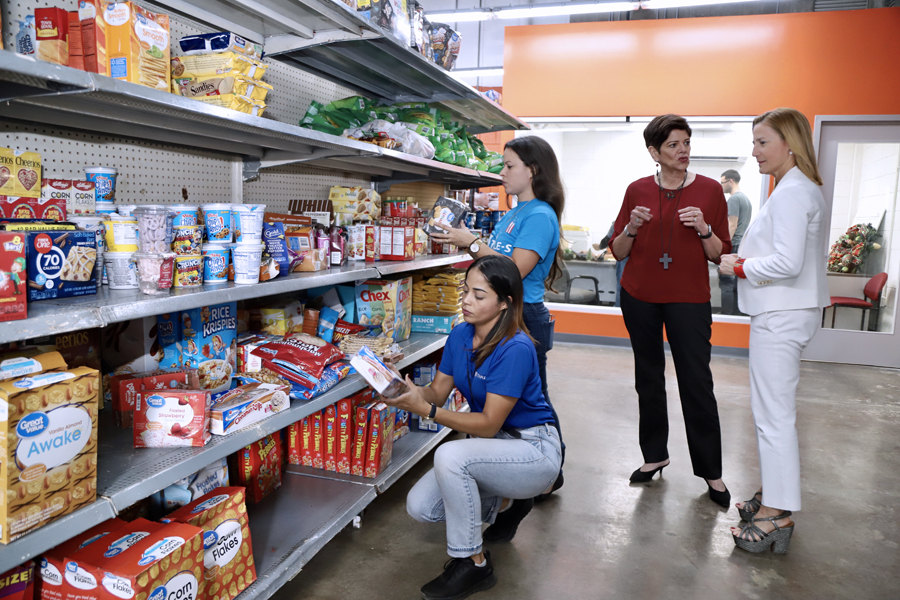Fundación Triple-S donates $250K to support food security

Fundación Triple-S has allocated $250,000 to support nonprofit organizations that are working to address food insecurity and other urgent needs in communities around Puerto Rico during the COVID-19 health crisis.
The first four organizations chosen to receive the funds are: World Central Kitchen Puerto Rico; Food Bank of Puerto Rico; Iniciativa Comunitaria; and Albergue El Paraíso.
“Each of these non-government organizations fights from a different perspective to ensure that Puerto Ricans have access to nutritious food and attain food security,” said Bobby García, Fundación Triple-S Chair and CEO of Triple-S Management.
“For our foundation, this is a primary cause and one of the social factors with the greatest impact on people’s health, particularly during this emergency,” he said.
“There’s no doubt that the crisis caused by COVID-19 has serious social and economic consequences that affect citizens, as well as the food distribution chain and our resurgent agriculture,” said García, noting that this is “particularly worrisome in Puerto Rico, which imports approximately 85% of its food.”
A 2015 study by the Puerto Rico Institute of Statistics found that three out of 10 adults over the age of 18 suffer from food insecurity in Puerto Rico, the company cited.
“This is an issue of vital importance for the well-being of our people. We understand that food insecurity worsened after Hurricane María and even more so with COVID-19, which has underscored our high level of poverty and vulnerable populations,” said García, who spoke about food security as a panelist at the Clinton Foundation Forum held in Puerto Rico in February.
The World Central Kitchen, one of the four organizations chosen to date, reactivated #ChefsForPuertoRico in an initiative that has brought onboard restaurants to prepare meals for health workers, homes for the elderly, and the police corps.
“The project purchases crops from local farmers to be used in their meals. At the same time, these restaurants can continue to operate and fulfill a critical social need,” said García.
Mikol Hoffman, director of WCK’s Plow to Plate program, said through this initiative, “not only can we provide an essential service to health workers and vulnerable populations, but we also have an opportunity to activate the local food economy and help restaurants and farmers keep their businesses operating.”
Meanwhile, the Food Bank of Puerto Rico is seeing unprecedented growth in the number of people who lack the resources to provide food for their families, García said.
“Puerto Rico faces another crisis, the third in the last 30 months: hurricanes, earthquakes, and now COVID-19. Every crisis comes with challenges, but each challenge, as it builds up, requires much more resilience and strength,” said Denise Santos, president of the Food Bank.
“This time the demand for food is incredible; the result of more than 300,000 new unemployed people, closed school cafeterias, government entities with limited resources to distribute aid, and many aid organizations closed by the curfew order. We’re working hard to bring food to each table, amid the difficult circumstances we are dealing with and thus ensure that we have the stamina to forge ahead,” Santos said.
Iniciativa Comunitaria, an organization that offers a range of services in areas of health, education, and prevention to marginalized populations, has expanded its food services in response to the quarantine.
“For the past five weeks, our team of Iniciativa Comunitaria employees and volunteers have been out on the streets, initially educating about COVID-19 and taking care of themselves while homeless,” said Yorelys Rivera-Amador, executive director of Iniciativa Comunitaria.
“This scenario has been changing as the days go by. We adjusted our interventions to the needs we see on the streets, we incorporated food into our routes and what started with 70 plates, increased to 180 plates of food that are delivered daily to homeless people and people who have lost their jobs and income,” she said.
“Along with this, they are given a mask and gloves with educational information about COVID. Each trip is made taking into account strict security and protective measures,” Rivera-Amador said.
Elsie Solano-Galán, founder of Albergue El Paraíso, said the nonprofit has “provided food even when access and sources have been very limited. The coronavirus pandemic brings us a new crisis, a new face of poverty.”
“The profile of our participants has changed dramatically. In addition to the homeless population, we’re serving the newly unemployed, immigrants, those whose income ceased or was abruptly reduced,” she added.
“People who are coming to us now have to deal with an existential dilemma: how to use their scarce resources for food, protection against the coronavirus and their health care,” she said.










